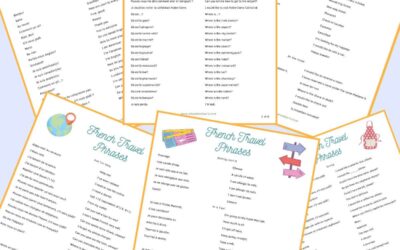If you are wondering what the heck “guillemets” are, you have come to the right place. French punctuation is not exactly what you might expect. English and French may both use the Latin alphabet, but the French writing style is quite different as are several punctuation marks.
Unlike English, the official rules of the French language are decided by several government institutions and bodies. The Académie Française is an institution created in 1635 and is responsible for defining the French language and teaching grammar, punctuation, as well as establishing an official dictionary.
In addition, there is the Délégation générale à la langue française et aux langues de France (DGLFLF), and the Conseil international de la langue française (CILF) to defend the French language at home in France and abroad.
Another institution, the Académie Goncourt was created by French writer Edmund de Goncourt because he thought all this was too restrictive. Nonetheless, the rules are still going strong.
And all this in just within France. Belgium, Quebec and other francophone-speaking regions have their own french language defenders.
Having lived in France for the past 10+ years, I should note it has taken me the better part of that time to get used to writing in this manner. On this blog, I use the written style format of American English for spelling and grammar. So let’s get to the main differences, shall we? Allons-y!
☞ READ MORE: Best French travel phrases for every occasion
1. The period and comma are inversed
The accountant in me does not get this french punctuation quirk at all. In France, the writing convention for numbers has the decimal point (the period) and the comma inversed, such as 1.000,00 for a thousand.
So one million, which would be written in French as:
1.000.000,00
French
instead of
1,000,000.00
English
However, certain institutions such as French banks that have an international footprint use the English convention and convert your comma into a decimal point or vice versa.
This is not helpful if you are trying to transfer 100.00 euros to someone and don’t accidentally want to transfer 10000 euros. French numbers are quite complicated in general, so this just adds to the drama!
2. Space between the word and the punctuation mark
Another interesting punctuation difference is that, in France, there is usually a space between the word and certain punctuation marks.
For example:
Félicitations !
meaning
Congratulations!
If you notice, there is a space between the word and the exclamation mark after. This doesn’t apply to all French punctuation marks, i.e. it doesn’t apply to the period, question mark or comma.
But it does apply to the colon, semi-colon, exclamation, and question marks. I confess, I usually ignore this rule when writing in French because sometimes it pushes the punctuation mark to the next line, when formatting on a computer. (One of our lovely readers, Kathy, pointed this one out because I usually forget this one!) Not the most obvious punctuation for the modern computer.
3. No Oxford Comma
If you use auto-correct on your writing program (MS Word, Google Docs, etc.), you will usually get the little error saying put a comma after the penultimate item in a list of three or more items, before an ‘and’ or ‘or’.
Un peintre, sculpteur et écrivain français.
French
would be:
A painter, sculptor, and writer.
English
That last comma is called the Oxford comma, and there is a big debate about it, even in English. Being French, well the Académie Française doesn’t really consider a need to follow the British Oxford.

4. The last name is written in Capitals
This one I will say is my favorite, French people write the last name in Capitals. It is eminently practical, and we should adopt this everywhere.
No more embarrassing mixups between first name and last name: Jean XAVIER. On official documents, regular life, etc. this one takes the guesswork out of your name.
5. Time is stated in 24 hours instead of 12
AM, PM, it is so unprecise. French people tell time the way the army does, which is in 24 hours. I can get fully onboard with this. Even when writing or speaking to other anglophones, I’m still tempted to write “let’s have a phone call at 20h”, instead of “8 pm”. What if someone got confused and wanted to chat at 8 am?
You can laugh, but since I’m in a different timezone from friends and family, this could happen! And I would be trying to shove the kids out the door to school, and getting ready in the morning.
6. The date is stated as “Day, Month, Year”
This is one for all the North Americans where we write “Month, Day, Year” instead of “Day, Month, Year”. I know it’s us New Worlders who are confusing on that one, Month before the Day makes no sense when everybody else is doing it the other way. It just confuses people when they look at a date like 3/1/2019.
Is that the 3rd of January or 1st of March? North Americans in France beware, it is Day, Month in France. This is equally the case if you are writing out the date as in “31 décembre 2020” and not “December 31, 2020”.
7. Date is written with Hyphen not the Slash punctuation mark
Speaking of the date, note that the date in French not written / and is usually written backwards. For example
2020-12-31
French
meaning
12/31/2020 or 31/12/2020
American or English
If you are entering a date in an automatic field on the internet in French, this is likely the format you will see.
8. Use « guillemets » instead of “quotes” for quotation marks
If you have seen these double arrows before, you now know what they are. A phrase would be written as:
Louise a dit : « Je veux une poupée pour Noël. »
French
meaning
Louise said: “I want a doll for Christmas.”
English
You will notice that in the French version, there is that extra space between the « » and the word.

9. Accent Grave and Aigu
The accents aigu and grave are signs placed on the vowels to modify the pronunciation. They are usually placed on the E as follows:
- é – E with accent aigu – to form a long sound e(y)
- è – E with accent grave – to form a short sound e
- e – regular E with sound e(h)
When spelling a word out loud, native French speakers won’t say “e avec accent grave” meaning “e with accent grave”, but will actually make the sound that lets the other person know which accent is being called out.
The accent aigu is also regularly used on the à, while the accent grave on the ù.
10. Circumflex
Another regular punctuation mark in French is the circumflex, which is written as ç. It is used to turn the c sound from a k to an s. For instance, garçon is pronounced gar-son (meaning boy).
11. Other Punctuation marks
And in case you were wondering, here are the common punctuation marks in French, along with their English translations:
| Punctuation Mark | English Translation |
|---|---|
| . un point | period, full stop |
| , une virgule | comma |
| : un deux-points | colon |
| ; un point-virgule | semicolon |
| ‘ une apostrophe | apostrophe |
| ! un point d’exclamation | exclamation point |
| ? un point d’interrogation | question mark |
| … les points de suspension | ellipsis |
| — un tiret | em dash |
| _ un souligné, un tiret bas | underscore |
| @ une arobase | web sign for at |
You can find the mathematical symbols and punctuation under my article on French numbers.

So where do you find all these French punctuation marks? If you have a french keyboard as I do (hint is called the AZERTY and not the QWERTY).
If you have an English computer, you have to manually go look for it under keyboard symbols on your computer. It is not that hard, but can be annoying if you are feeling lazy! You can also change your keyboard settings to a French-Canadian keyboard, which will be a QWERTY with the French accents, rather than an AZERTY.
Any other difference I’ve missed? If you enjoyed this article, you can read more about French cultural differences here. In addition, check out our other resources to learn French. A bientôt!





A space before colon, semi colon, exclamation and question marks.
So true! I always remove them, because sometimes on the computer the formatting moves the punctuation to a new line, which just looks strange. But it does give it more space and is easier to read. I will add it to the list 🙂